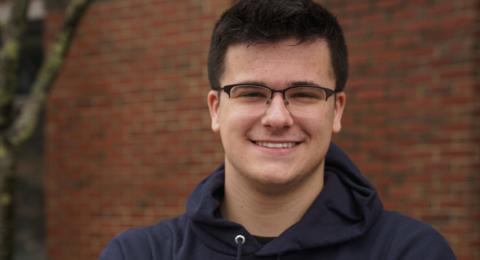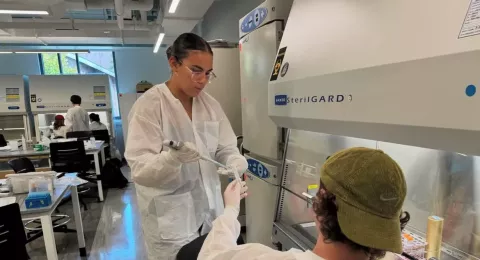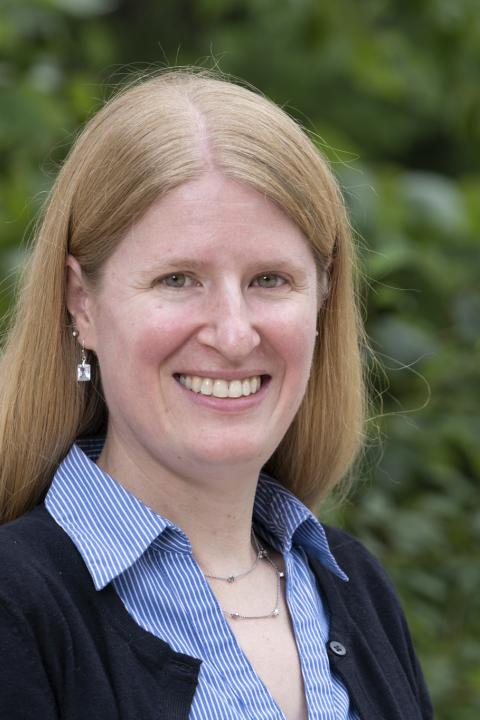Choosing to major in Biochemistry, Molecular, and Cellular Biology at UNH offers you a deep dive into the fundamental processes of life at the molecular level. This major provides a solid foundation in both biology and chemistry, equipping you with the skills to understand complex biological systems and molecular interactions. With a focus on critical thinking, problem-solving and hands-on laboratory experience, you will be well-prepared for careers in research, medicine, biotechnology and pharmaceuticals. The interdisciplinary nature of this field fosters a versatile skill set, opening doors to advanced study and diverse career opportunities in cutting-edge scientific fields.
What is biochemistry, molecular and cellular biology?
The intertwined disciplines of biochemistry, molecular biology and cell biology are key to understanding the molecular and cellular foundations of life. A BMCB degree prepares you for immediate employment as a research technician or for entry into graduate school or into professional programs in medicine, dentistry or other allied health professions. Areas of faculty specialization include cell signaling pathways, pharmacology, cancer biology, neurobiology, structural biology, and proteomics.
Why study biochemistry, molecular and cellular biology at UNH?
The BMCB degree program provides a rigorous academic curriculum integrated with laboratory experiences to foster inquiry-based learning and to train creative and critical thinkers. Students can gain additional technical skills and exposure to state-of-the-art instrumentation by participating in independent research experiences with highly respected faculty and their collaborators around the world. The BMCB major is designed so students can in four years complete all the prerequisite courses needed for admission to graduate schools or health professional schools. Graduates are well-prepared for employment in biotechnology and pharmaceutical companies, hospitals or academic labs. An accelerated five-year program to earn a combined bachelor's and master's degree in biochemistry is also available for students who qualify.
Potential careers
- College professor
- Dentist
- Laboratory technician
- Lawyer
- Pharmacist
- Physician
- Physician assistant
- Research scientist
- Science journalist or medical writer
Curriculum & Requirements
The Biochemistry, Molecular & Cellular Biology (BMCB) major provides you with conceptual competence, analytical skills, and laboratory experiences to understand life at the molecular and cellular level. Your BMCB degree will prepare you for immediate employment as a research associate in industry, for entry into graduate or professional programs in medicine, dentistry or other allied health professions, and other career tracks.
The BMCB program offers advanced coursework and laboratories in diverse research areas of modern biology
- Cancer biology
- Cell biology
- Cell culture & tissue engineering
- Endocrinology
- Molecular biology
- Pharmacology
- Physical biochemistry
- Protein structure, function & proteomics
BMCB majors participate in experiential learning activities
- Many courses have integrated laboratory experiences to foster inquiry-based learning and to train creative and critical thinkers
- Independent research experiences are available in faculty research laboratories
- Many courses provide exposure to cutting-edge techniques and instrumentation
- Job preparation can be enhanced by internships with regional biotechnology and pharmaceutical companies
- Summer undergraduate research fellowships at U.S. or international academic institutions combine travel with research opportunities outside UNH
BMCB graduates have been successful in many careers
- Research associates and laboratory technicians
- Biotechnology and pharmaceutical companies
- Government agencies
- Forensics laboratories
- Academic research laboratories
- Hospitals
- Science journalists and technical writers
- Healthcare workers
- Pharmaceutical sales and marketing staff
- Regulatory agency staff
- Primary and secondary school educators (with additional coursework in education)
BMCB graduates are well prepared for post-baccalaureate education
- Masters and doctoral programs in a wide variety of disciplines
- Professional health programs
- Medical
- Dental
- Pharmacy
- Physician’s Assistant and other allied health programs
Note: The BMCB major is designed so you can complete all of the prerequisite courses needed to seek admission to graduate schools or health professional schools in four years.
Sample Degree Plan
This sample degree plan serves as a general guide; students collaborate with their academic advisor to develop a personalized degree plan to meet their academic goals and program requirements.
| First Year | ||
|---|---|---|
| Fall | Credits | |
| MCBS 401 | Professional Perspectives in Molecular, Cellular, and Biomedical Sciences | 1 |
| ENGL 401 | First-Year Writing | 4 |
| CHEM 403 | General Chemistry I | 4 |
| BIOL 411 | Introductory Biology: Molecular and Cellular | 4 |
| Discovery Course | 4 | |
| Credits | 17 | |
| Spring | ||
| CHEM 404 | General Chemistry II | 4 |
| BIOL 412 | Introductory Biology: Evolution, Biodiversity and Ecology | 4 |
| MATH 424B | Calculus for Life Sciences | 4 |
| Discovery Course | 4 | |
| Credits | 16 | |
| Second Year | ||
| Fall | ||
| CHEM 547 & CHEM 549 | Organic Chemistry I and Organic Chemistry Laboratory | 5 |
| BMS 503 & BMS 504 | General Microbiology and General Microbiology Laboratory | 5 |
| BIOL 528 | Applied Biostatistics I | 4 |
| PHYS 401 | Introduction to Physics I | 4 |
| Credits | 18 | |
| Spring | ||
| CHEM 548 & CHEM 550 | Organic Chemistry II and Organic Chemistry Laboratory | 5 |
| GEN 604 | Principles of Genetics | 4 |
| PHYS 402 | Introduction to Physics II | 4 |
| Discovery Course | 4 | |
| Credits | 17 | |
| Third Year | ||
| Fall | ||
| BMCB 605 | Principles of Cell Biology | 4 |
| BMCB 751 | Principles of Biochemistry I | 4 |
| BMCB Core or Lab Techniques course | 4-5 | |
| Discovery Course | 4 | |
| Credits | 16-17 | |
| Spring | ||
| BMCB 752 | Principles of Biochemistry II | 4 |
| BMCB Core or Lab Techniques course | 4-5 | |
| Discovery Course | 4 | |
| Elective (any course) | 4 | |
| Credits | 16-17 | |
| Fourth Year | ||
| Fall | ||
| BMCB Major Elective (possible Capstone) | 4 | |
| Discovery Course | 4 | |
| BMCB Major Elective (any course) | 4 | |
| Elective (any course) | 4 | |
| Credits | 16 | |
| Spring | ||
| Elective (any course) | 4-5 | |
| BMCB Major Elective | 4 | |
| Elective (any course) | 4 | |
| Credits | 12-13 | |
| Total Credits | 128-131 | |
Degree Requirements
All Major, Option and Elective Requirements as indicated.
*Major GPA requirements as indicated.
Major Requirements
Students in the Biochemistry, Molecular and Cellular Biology (BMCB) major take eight Foundation courses, four Bioscience Core courses, five BMCB Core courses, one Laboratory Techniques course, and three Major Elective courses. One capstone experience, supervised and approved within the major, is required of all seniors. In addition, all other University academic requirements must be completed, including those for the Discovery Program and the University Writing Requirement.
A grade of C- minus or better is required in all Foundation Core, Bioscience Core, BMCB Core, Laboratory Techniques, and Major Elective courses.
| Code | Title | Credits |
|---|---|---|
| Foundation Core Courses | ||
| CHEM 403 | General Chemistry I 1 | 4 |
| CHEM 404 | General Chemistry II | 4 |
| CHEM 547 & CHEM 549 | Organic Chemistry I and Organic Chemistry Laboratory 2 | 5 |
| CHEM 548 & CHEM 550 | Organic Chemistry II and Organic Chemistry Laboratory 2 | 5 |
| MATH 424B | Calculus for Life Sciences 3, 4 | 4 |
| BIOL 528 | Applied Biostatistics I 4 | 4 |
| PHYS 401 | Introduction to Physics I 5 | 4 |
| PHYS 402 | Introduction to Physics II 5 | 4 |
- 1
Fulfills Physical Science Discovery requirement
- 2
CHEM 651/CHEM 653 & CHEM 652/CHEM 654 can be substituted for CHEM 547/CHEM 549 & CHEM 548/CHEM 550.
- 3
Fulfills Quantitative Reasoning Discovery requirement
- 4
MATH 425 and MATH 426 can be substituted for MATH 424B and BIOL 528
- 5
PHYS 407 and PHYS 408 can be substituted for PHYS 401 and PHYS 402
| Code | Title | Credits |
|---|---|---|
| Bioscience Core Courses | ||
| BIOL 411 | Introductory Biology: Molecular and Cellular 6 | 4 |
| BIOL 412 | Introductory Biology: Evolution, Biodiversity and Ecology | 4 |
| BMS 503 & BMS 504 | General Microbiology and General Microbiology Laboratory | 5 |
| GEN 604 | Principles of Genetics | 4 |
- 6
BIOL 411 fulfills the Biological Science Discovery requirement, Discovery Laboratory requirement, and Discovery Inquiry requirement
| Code | Title | Credits |
|---|---|---|
| BMCB Core Courses | ||
| MCBS 401 | Professional Perspectives in Molecular, Cellular, and Biomedical Sciences | 1 |
| BMCB 605 | Principles of Cell Biology | 4 |
| BMCB 751 | Principles of Biochemistry I | 4 |
| BMCB 752 | Principles of Biochemistry II | 4 |
| GEN 704 | Microbial Genetics and Genomics | 4-5 |
| or GEN 771 | Molecular Genetics | |
| Code | Title | Credits |
|---|---|---|
| Laboratory Techniques Courses | ||
| Select one course from the following: | ||
| BMCB 753 | Cell Culture | 5 |
| BMCB 754 | Molecular Biology Research Methods | 5 |
| BMCB 755 | Protein Biochemistry Laboratory | 5 |
| BMS 725 | Cell Phenotyping and Tissue Engineering Laboratory | 4 |
| CHEM 741 | Chemical Biology Laboratory | 4 |
| Code | Title | Credits |
|---|---|---|
| BMCB Major Electives | ||
| Select three courses from the following: (A total of three unique major electives are required.) | ||
| BMCB 750 | Physical Biochemistry | 3 |
| BMCB 753 | Cell Culture 7 | 5 |
| BMCB 754 | Molecular Biology Research Methods 7 | 5 |
| BMCB 755 | Protein Biochemistry Laboratory 7 | 5 |
| BMCB 760 | Pharmacology | 4 |
| BMCB 763 | Biochemistry of Cancer | 4 |
| BMCB 794 | Protein Structure and Function | 4 |
| BMCB 795 | Investigations in Molecular and Cellular Biology (4-credit minimum) 8 | 1-4 |
| BMCB 795W | Investigations in Molecular and Cellular Biology (4-credit minimum) 8 | 1-4 |
| BMCB 799 | Senior Thesis (4-credit minimum) 8 | 1-4 |
| BMCB 799H | Honors Senior Thesis (4-credit minimum) 8 | 1-4 |
| BMS 507 & BMS 508 | Human Anatomy and Physiology I and Human Anatomy and Physiology II | 8 |
| BMS 650 | Molecular Diagnostics | 4 |
| BMS 702 | Endocrinology | 4 |
| BMS 704 | Pathologic Basis of Disease | 4 |
| BMS 705 & BMS 715 | Immunology and Immunology Laboratory | 5 |
| BMS 706 & BMS 708 | Virology and Virology Laboratory | 5 |
| BMS 718 | Mammalian Physiology | 4 |
| BMS 725 | Cell Phenotyping and Tissue Engineering Laboratory 7 | 4 |
| BMS 735 | Molecular and Cellular Parasitology | 4 |
| BMS 740 | Human Microbiome | 4 |
| BIOL 706 | Data Science with R for the Life Sciences | 4 |
| CHBE 755 | Computational Molecular Bioengineering | 4 |
| CHEM 740 | Chemical Biology | 3 |
| CHEM 755 | Advanced Organic Chemistry | 3 |
| GEN 704 | Microbial Genetics and Genomics 7 | 5 |
| GEN 705 | Population Genetics 9 | 3 |
| GEN 706 | Human Genetics | 4 |
| GEN 711 | Genomics and Bioinformatics | 4 |
| GEN 712 | Programming for Bioinformatics | 5 |
| GEN 715 | Molecular Evolution | 4 |
| GEN 717 | Molecular Microbiology | 5 |
| GEN 721 | Comparative Genomics | 4 |
| GEN 771 | Molecular Genetics 7 | 4 |
| NUTR 750 | Nutritional Biochemistry | 4 |
- 7
If course is used to fulfill BMCB Core or Laboratory Technique requirement, course cannot count as BMCB Major Elective.
- 8
Choose no more than ONE of the following courses to fulfill a major elective: BMCB 795, BMCB 795W, BMCB 799, BMCB 799H
- 9
Taking GEN 725 Population Genetics Lab is recommended, but not required.
Approved BMCB Capstone Courses
The capstone explores areas of interest based on the integration of prior learning. The capstone requirement may be satisfied through a course, created work or product, or some form of experiential learning (e.g., honors thesis, mentored research project, or other special student activity). Students may take more than one capstone course. If a second Lab Techniques course is taken, the second Lab Techniques course may count as a Capstone. Capstone completion is never displayed on Degree Works; your advisor will certify capstone completion at the time of graduation. Students must have 90 credits or more when completing their capstone requirement. See your advisor for questions about capstones.
| Code | Title | Credits |
|---|---|---|
| BMCB 750 | Physical Biochemistry | 3 |
| BMCB 760 | Pharmacology | 4 |
| BMCB 763 | Biochemistry of Cancer | 4 |
| BMCB 794 | Protein Structure and Function | 4 |
| BMCB 795 | Investigations in Molecular and Cellular Biology (4-credit minimum) | 1-4 |
| BMCB 795W | Investigations in Molecular and Cellular Biology (4-credit minimum) | 1-4 |
| BMCB 799 | Senior Thesis (4-credit minimum) | 1-4 |
| BMCB 799H | Honors Senior Thesis (4-credit minimum) | 1-4 |
| BMS 702 | Endocrinology | 4 |
| INCO 790 | Advanced Research Experience (4-credit minimum) | 1-4 |
For a Capstone experience not listed above, such as an internship, submit a Capstone Approval form prior to beginning the experience.
Program Learning Outcomes
Core Knowledge in Biochemistry, Molecular Biology, and Cell Biology
- Students will be able to explain the structure and function of macromolecules, including key functional groups, higher order structure and function of macromolecules, catalysis and enzyme kinetics.
- Students will be able to explain matter and energy conversion, including thermodynamics, catalysis, biological energy, ATP and its function in metabolism.
- Students will be able to explain cellular homeostasis, including major metabolic pathways for carbohydrates, lipids, proteins and nucleic acids, key regulatory steps in these pathways and the organization of metabolic enzymes.
- Students will be able to explain the flow of biological information, including detailed replication, transcription and translation processes in the context of homeostasis and development.
Quantitative Literacy, Inquiry & Analysis
- Students will be able to apply the scientific method to examine experimental evidence and draw informed conclusions.
- Students will be able to use graphs to represent scientific data.
- Students will be able to apply statistical methods to interpret scientific data.
Critical Thinking & Problem Solving
- Students will be able to use data to troubleshoot an unexpected outcome.
- Students will be able to apply core knowledge to critically interpret scientific data.
Written Communication
- Students will demonstrate written skills to communicate scientific knowledge and experimental data.
Oral Communication
- Students will be able to demonstrate oral presentation skills to communicate scientific knowledge and experimental data.
Explore Program Details
What kind of educational preparation does the BMCB program provide?
The BMCB provides students with conceptual competence, analytical and laboratory skills to understand life at the molecular and cellular level, through advanced coursework and laboratories in diverse research areas of modern biology.
The BMCB degree will prepare students for immediate employment as research associates, for entry into graduate or professional programs in medicine, dentistry or other allied health professionals, as well as other career tracks.
What types of jobs or careers do most BMCB majors go into?
About one-third of our majors are interested in research-oriented career track, and many got into top graduate programs in research institutions such as Chicago, Dartmouth, Duke, U Mass Medical School, U Maryland, U Wisconsin-Madison etc. in recent years.
About one-third are interested in health professional career, and attend professional health programs in medicine, dentistry, pharmacy, physician assistant, etc. About one-third of our majors join the workforce right away and work as research associates in the R&D sector of biotech or pharmaceutical companies, or biomedical research institutions. Some students work in pharmaceutical sales or in science-related non-profits, to give just a few examples.
What types of career development advice do most BMCB majors go into?
Our students receive career advice through a variety of channels. Each BMCB major has an academic advisor, who oversees their academic progress and points to appropriate resources on campus. For students who are interested in health professions, the college has a full-time pre-professional health advisor who provides detailed suggestions and supports our students’ application to health professional schools. Some BMCB faculty members have extensive experience in major medical schools and help prepare students in advising.
For students who want to join the work force right after graduation, the college has an endowed St. Martin Career Exploration Office who organizes career fairs, campus interviews, internship opportunities. The career center also provides resume review sessions, LinkedIn workshops and practice interviews. For students who feel passionate about research, faculty members BMCB, Genetics, Biomedical Sciences and Chemistry provide a plethora of research opportunities.
Do students have difficulty finding time to declare a minor or get involved in research, clubs, or other activities that they enjoy?
Not at all. While being rigorous, our curriculum is designed with great flexibility for students to explore and grow not only for a variety of career paths passions, but also as future citizens with social responsibility. In the 1-credit Freshman Orientation seminar (Professional Perspectives in BMCB), we provide additional resources to help students know campus resources, set academic goals and become engaged in campus life.
Is it possible to Study Abroad when you are a BMCB major?
Absolutely, but it requires planning! Our BMCB majors take a full year of Chemistry, Organic Chemistry and Biochemistry in their first three years. So, they often study abroad in the summer or J-term to stay on track. It is a good idea to discuss with your advisor early on, so that you reserve appropriate Discovery Courses for study abroad. For instance, you get the World Cultures Discovery automatically if you do a semester abroad, so hold off on taking one of those courses at UNH. Plus, Discovery courses taken abroad give you an opportunity to learn more about the history, literature, and culture of the country you are visiting.
Are courses taught by professors and do they hold office hours?
Almost all our courses are taught by professors. They have scheduled office hours every week but are usually also available for meetings by appointment. In addition, many courses have teaching assistants (graduate students) who also hold weekly office hours.
What is a typical class size?
Class sizes vary quite a lot - there is no typical size. Usually, introductory courses taken in freshman year tend to be large (~200 students); while major required or elective courses are small (20-40 students). For example, in ENGL 401 Freshman English, the class size is 24 but in BIOL 411 Introductory Biology: Molecular & Cellular, the lecture is about 200 students. However, large classes almost always have a lab or recitation each week which has only 25-30 students.
Are there opportunities for students to do research?
Yes, lots of opportunities. Faculty members in the BMCB program are highly accomplished, well-funded researchers with undergraduate researchers in their group all the time. UNH has a long-standing tradition in undergraduate research and has a large Undergraduate Research Conference every spring semester where students present their work and mingle with other researchers. In addition, the endowed Hamel Center for Undergraduate Research sponsors a variety a research programs (REAP, UROP, SURF, IROP) to financially support undergraduate research activities.
Can students get credit for doing research?
Yes. Students can enroll in BMCB 795, BMCB 799, INCO 590, or INCO 790 to earn credit for the research they are conducting with a faculty member.
Can first year students do research?
Yes, some BMCB freshmen carry out research with a faculty member. However, we usually advise students to focus on exceling in coursework, engaging in campus life and finding research areas they feel passionate about in their freshman year. Students in the honors program can consider the Research Experience and Apprentice Program (REAP) in freshman summer.
Can students get paid for the time that they spend doing research?
Yes, but not if you are taking research for credit. There are several ways to get paid. First, a faculty member may have funding to pay you from grant funds. Second, if you have work-study as financial aid, a faculty member may have funds to pay the matching portion of your aid. Third, the Hamel Center for Undergraduate Research at UNH administers several competitive research programs (REAP, UROP, SURF, IROP) that students can apply for once they’ve identified a faculty mentor.
What are some good clubs to get involved in if you want to meet people?
There is a club for almost anything you can think of. Anything that interests you can help you meet new people on campus. There are several clubs relating to science and biology that are popular among COLSA students such as: Women in Science, Lab Science Society, American Red Cross, and the UNH chapter of American Society for Biochemistry and Molecular Biology.
As part of the University of New Hampshire’s Discovery Program requirements, all students must complete a Capstone experience.
This accelerated five-year program leading to a combined bachelor and master's degree in biochemistry is designed for highly motivated and qualified students seeking additional training to further their career goals as a researcher in the life sciences.
Admission to the combined degree program is highly competitive. Students wishing to pursue this option must have a grade point average greater than 3.2 at the time of application. A thesis advisor must be identified during the junior year, and the approval of the advisor must be obtained. Prior to the first semester of the senior year, the student must formally apply to the department through the Graduate School and receive early admission. The requirement for the Graduate Record Examinations is waived for combined degree applicants.
Thirty credits of graduate level (800-999) course work (including dual credit courses) must be completed. Six to eight credits must be taken during the senior year, and are applied to both the B.S. and M.S. requirements. All other requirements for the M.S. degree must be followed.
Limited financial support for the M.S. component of this combined degree program may be available through University Financial Aid or from the student's project advisor.
Advising is available for UNH students, alumni, and post baccalaureates pursuing health professional careers.
The Pre-Health Advising Office provides support throughout the process of preparing for health professions school from advising on the courses they should take to helping navigate through the complex steps of the application process.
Register with Pre-Professional Health Office
Students interested in the Biochemistry, Molecular and Cellular Biology major may also be interested in the following advanced degrees at UNH. Students in the program also have the opportunity to participate in the UNH accelerated master’s program.
Molecular and Cellular Biotechnology M.S.
Molecular and Evolutionary Systems Biology Ph.D.
Biotechnology: Industrial and Biomedical Sciences, Manchester M.S.


















